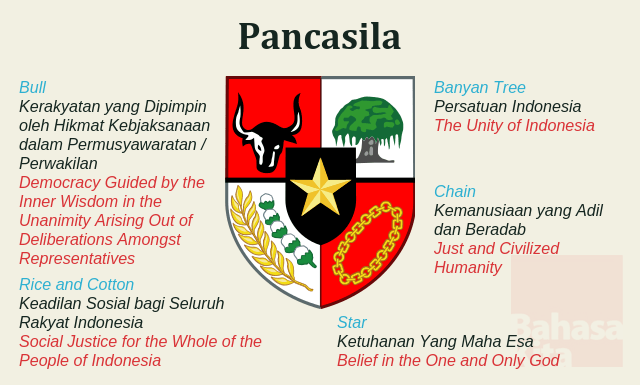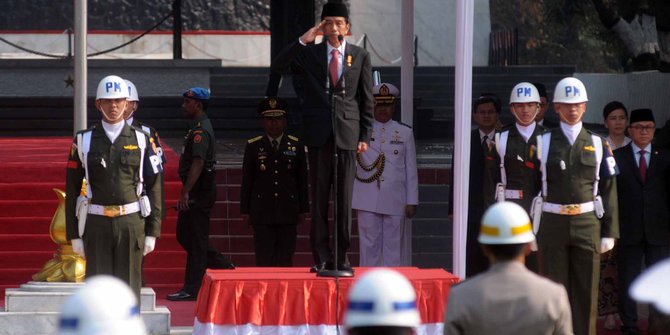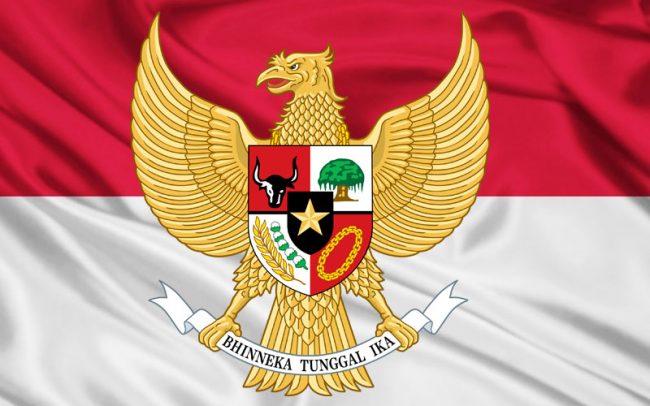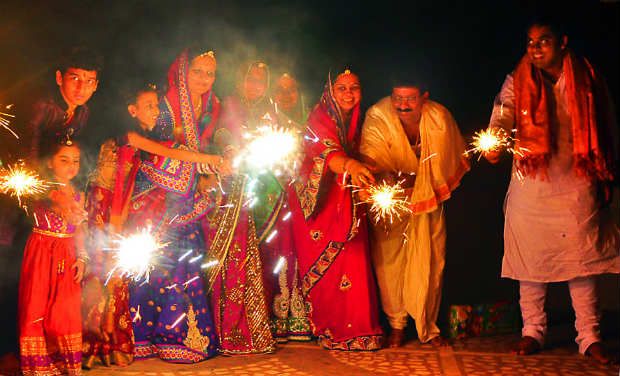Pancasila day is celebrated on the 1st June and is a public holiday. It celebrates the national principles – Pancasila, the Javanese expression of ‘five principles’, the state ideology of Indonesia, as put forward in a speech by Indonesia’s First President Sukarno in 1945.
What is Pancasila principles?
- Belief in the Supreme God
- A just and civilized humanity.
- The national unity of Indonesia.
- Democracy led by the wisdom of deliberations among representatives.
- Social justice for all Indonesian people

This is Indonesia’s coat of arms, the five images that symbolize Pancasila:
- The golden star located at the center represents the Divinity. The golden color symbolizes the enlightening power of the Divinity, and its five points in the star represents the five official religions recognized in Indonesia.
- The banyan tree at the upper right corner represents the unity of Indonesia. It’s a large tree with many roots, symbolizing Indonesia’s various ethnicities and tribes. Roots also meant that Indonesians all over the world will return and unite to achieve national objective.
- The head of a bull at the upper left corner represents musyawarah (democracy with deliberation), because bulls are known to be social animals that always gather in groups. For that reason, the bull represents Indonesian preference for mutual cooperation between various groups.
- The single stalk of rice grain and cotton on the bottom left corner represents social justice for all Indonesians. Most Indonesians eat rice and cotton is used to make clothes, so both of these represent the basic needs of the society. These stalks also represent Indonesia’s intention to eradicate social inequality.
- The chain at the bottom right corner represents humanity that is just and civil. The circle in the chain represents women while the rectangular shape represents men. Bonded into an everlasting circle, the chain symbolizes the need for humans to connect and support each other.
Origin
After the independence of Indonesia, Sukarno was tasked to unite Indonesia into a sovereign country based on underlying ideologies. After careful deliberation, Sukarno revealed the ideologies of ‘Pancasila’ in his famous speech.
One important point that he emphasized in his speech was unity and respect towards each other. It was Sukarno’s intention to resolve contrasting ideologies in Indonesia and unite them with Pancasila. Indonesia’s national motto, ‘Bhinneka tunggal ika‘, which means ‘unity in diversity‘ is the foundation.
Even if the majority population is Muslim, Pancasila appeals to Muslims, Christians and Nationalists. Bahasa Indonesia is used rather than Javanese, so as not to give too much advantage to the majority population. Indonesia is also not a Muslim country, even with majority of Muslim population.
As a result of the unity of various ethnicity and religions, Pancasila became mix of nationalism, socialism and monotheism. It aims for a society based on democracy and social justice that emphasizes on religiosity and monotheism.
Indonesia Today

‘Pancasila Day’ is celebrated by the country’s leadership to honor its creation on June 1st. There is a moment of silence to commemorate the fallen heroes, the reading of Pancasila, the song of Andhika Bayangkari (song about Pancasila and Indonesian ideologies), and finally raising the Indonesian flag and prayers for the country.
This day is also a reminder to all Indonesian citizens of the struggle and sacrifices of the fallen heroes towards Indonesia’s independence and Pancasila.






